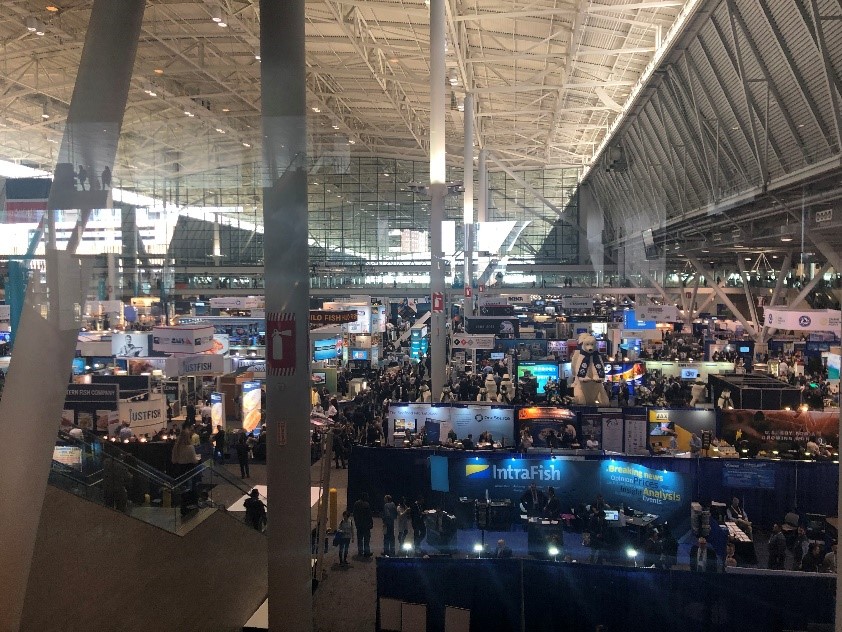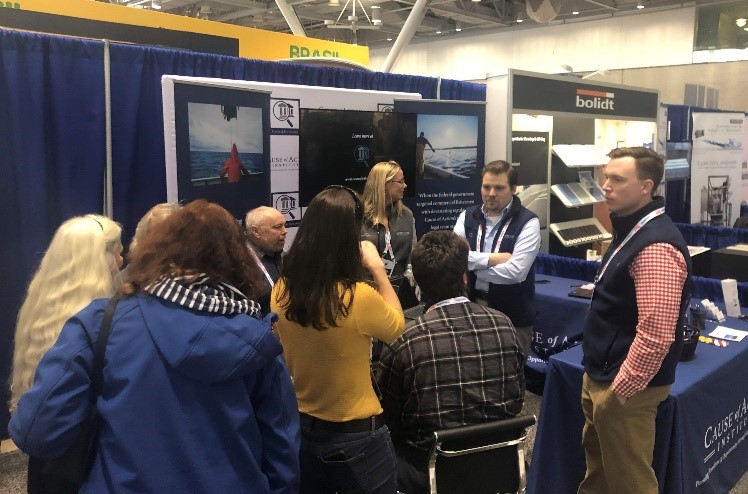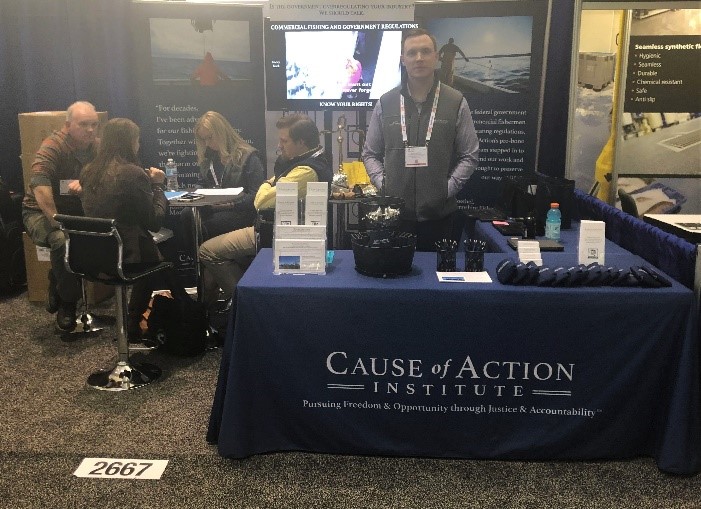Washington D.C. – Cause of Action Institute today filed a notice of appeal to the U.S. Court of Appeals for the District of Columbia Circuit on behalf of several family-owned fishing companies based in New Jersey, who hope to block a new regulation that would force them to pay for third-party “at-sea monitors.” That regulation—which was designed by the New England Fishery Management Council and promulgated by the National Oceanic Atmospheric Administration—requires certain boats in the Atlantic herring fishery to carry “at-sea monitors” and at industry’s cost, all without congressional authorization.
Family Fishermen Challenge Illegal, Industry-Killing At-Sea Monitoring Rule from Department of Commerce
Arlington, VA (Feb. 19, 2020) – Cause of Action Institute (“CoA Institute”) today filed a lawsuit on behalf of a group of New Jersey family fishermen to block a new regulation that would force them to pay for third-party “at-sea monitors.” The industry-killing rule—which was designed by the New England Fishery Management Council and promulgated by the National Oceanic and Atmospheric Administration and U.S. Department of Commerce—will require certain boats in the Atlantic herring fishery to carry “at-sea monitors” and at their own cost. Learn More
White House Issues Executive Orders Curtailing Use of Guidance Documents to Bypass Notice-and-Comment Rulemaking and Imposing Public Disclosure Requirement
On October 9, 2019, the White House issued two executive orders designed to curtail the abuse of guidance documents by government agencies. Both orders address due process violations by agencies by requiring notice and an opportunity to be heard before action can be taken or liability imposed against alleged wrongdoers. Learn More
Recap: Cause of Action Institute at Seafood Expo North America 2019
Earlier this month, Cause of Action Institute joined more than 20,000 members of the fishing industry from across the globe at the 2019 Seafood Expo North America in Boston. For years, Cause of Action has monitored and brought legal challenges against the overregulation of our nation’s fisheries and its negative economic impact on fishing communities – especially small business and family owned operations. However, after three days of speaking with industry insiders last week, the breadth of the harm caused by administrative state overreach continues to appall us.

We spoke with people from nearly every corner of the seafood industry who are severely impacted by the government regulations that plague this field: trade restrictions such as tariffs or quotas, the cost of complying with regulations such as the Jones Act, one size fits all or outdated regulations that benefit certain companies at the expense of others, and offshore development that has the potential to bring many companies’ business to a standstill. Many of the visitors we engaged with were small business owners who fear regulations like industry-funded monitoring will run them out of business entirely.

Cause of Action was fortunate to be able to reconnect with former clients David Goethel and John Haran. For David, John, and many members of their respective communities, fishing is not only their livelihood, but also a large part of the culture of their respective communities. When faced with economic devastation from regulations like the Omnibus Amendment, the way of life that communities have spent years building is also threatened with destruction.

Cause of Action Staff with former client David Goethel
Stories like those we encountered last week serve as an important reminder of the direct consequences posed by arbitrary and excessive executive power. American’s should be free to live prosperous lives and reach their highest potential without the interference of an overbearing administrative state, and Cause of Action looks forward to continuing to strive towards this goal in the commercial fishing industry, among many other affected fields.

–
Mallory Koch is a communications associate at Cause of Action Institute.
CoA Institute Highlights Deficiencies in Proposed Rule to Shift Burdensome Costs of At-Sea Monitoring to Commercial Fishermen
The New England Fishery Management Council (NEFMC), in coordination with the National Marine Fisheries Service (NMFS), seeks to approve and implement a controversial set of regulatory amendments that would create a new industry-funding requirement for at-sea monitoring in the Atlantic herring fishery and, moreover, create a standardized process for introducing similar requirements in other New England fisheries. Under the so-called Omnibus Amendment, the fishing industry would be forced to bear the burdensome cost of allowing third-party monitors to ride their boats in line with the NEFMC’s supplemental monitoring goals. This would unfairly and unlawfully restrict economic opportunity in the fishing industry.
SEC Adopts CoA Institute’s Recommendations in Updated FOIA Regulations
The Securities and Exchange Commission (“SEC”) finalized new Freedom of Information Act (“FOIA”) regulations today, adopting two revisions from a comment that Cause of Action Institute (“CoA Institute”) proposed in January 2018. The FOIA allows for the disclosure of records of federal agencies, including documents, emails, and reports, and is an essential tool for promoting government transparency.
CoA Institute made three recommendations in response to the SEC’s proposed rulemaking. First, we urged the agency to remove outdated “organized and operated” language from its definition of “representative of the news media.” Such language has been used in the past to deny FOIA fee waivers to organizations like CoA Institute that investigate agency waste, fraudulent activity, cronyism, and wrongdoing. In 2015, we argued Cause of Action v. Federal Trade Commission before the D.C. Circuit, which resulted in a landmark ruling that invalidated the “organized and operated” requirement.
In Cause of Action, the D.C. Circuit clarified proper fee category definitions and the application of fees for FOIA requests. CoA Institute cited this case in its comment to the SEC and the agency concurred with our proposal to remove the outdated “organized and operated” language from its definition of a news media requester. The FTC also acknowledged the D.C. Circuit’s landmark decision in its final rule.
Second, CoA Institute recommended eliminating “case-by-case” fee category determinations. Under the original rule proposed by the SEC, FOIA offices would “determine whether to grant a requester news media status on a case-by-case basis based upon the requester’s intended use of the requested material.” CoA Institute again cited Cause of Action to argue that the focus of the fee waiver inquiry should be on “requesters, rather than [their] requests.” The SEC agreed and removed the restrictive language.
Finally, CoA Institute recommended that the SEC recognize that a news media requester may use “editorial skills” to turn “raw materials into a distinct work” when writing documents such as press releases and editorial comments. This understanding broadens the potential pool of news media requesters and our recommendation tracks language from the D.C. Circuit’s decision in Cause of Action. Although, in this respect, we did not recommend any specific changes to the final rule the SEC nevertheless acknowledged our comments by stating that it “will consider Cause of Action and any other relevant precedents in applying the fee provisions in its regulations.”
Americans have an interest in living free and prosperous lives without the interference of arbitrary and abusive executive power. One of the ways CoA Institute monitors government overreach is by fighting for access to information on the federal government’s activities. Our successful comment is a small but important victory in our work to ensure a transparent government that works for the benefit of all Americans.
Chris Klein is a Research Fellow at Cause of Action Institute
Family Fishermen Move to Block Industry-Killing At-Sea Monitoring Rule
Herring Fishermen are Fighting Burdensome Regulation, COVID-19, and New, Unlawful Monitoring Requirements to Stay Afloat
Arlington, VA (June 8, 2020) – Cause of Action Institute (CoA Institute) today filed a motion for summary judgement on behalf of a group of New Jersey fishermen, asking a D.C. Federal Court to vacate job-killing fisheries regulations called the “Omnibus Amendment.” CoA Institute filed suit in February to challenge the industry-killing rule, which requires certain boats in the Atlantic herring fishery to carry “at-sea monitors” at their own cost.
Learn More